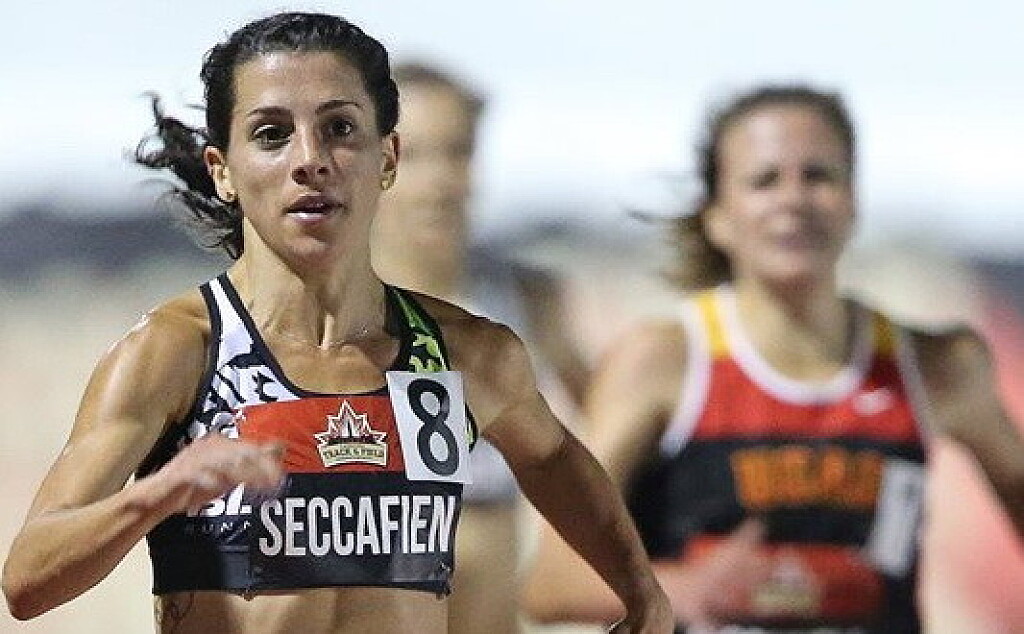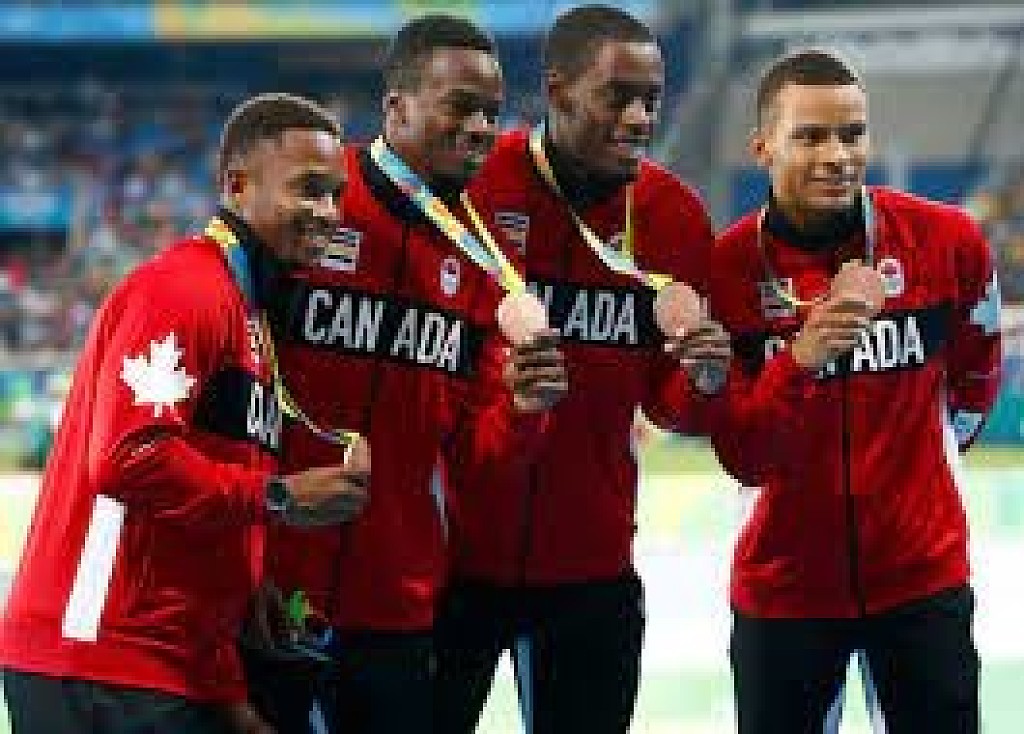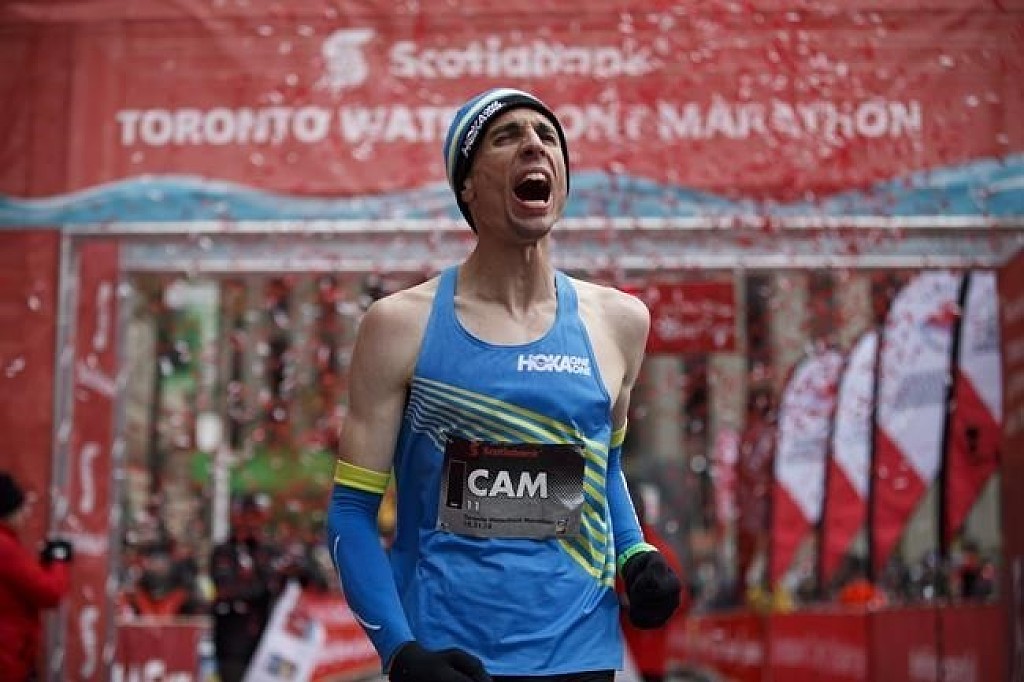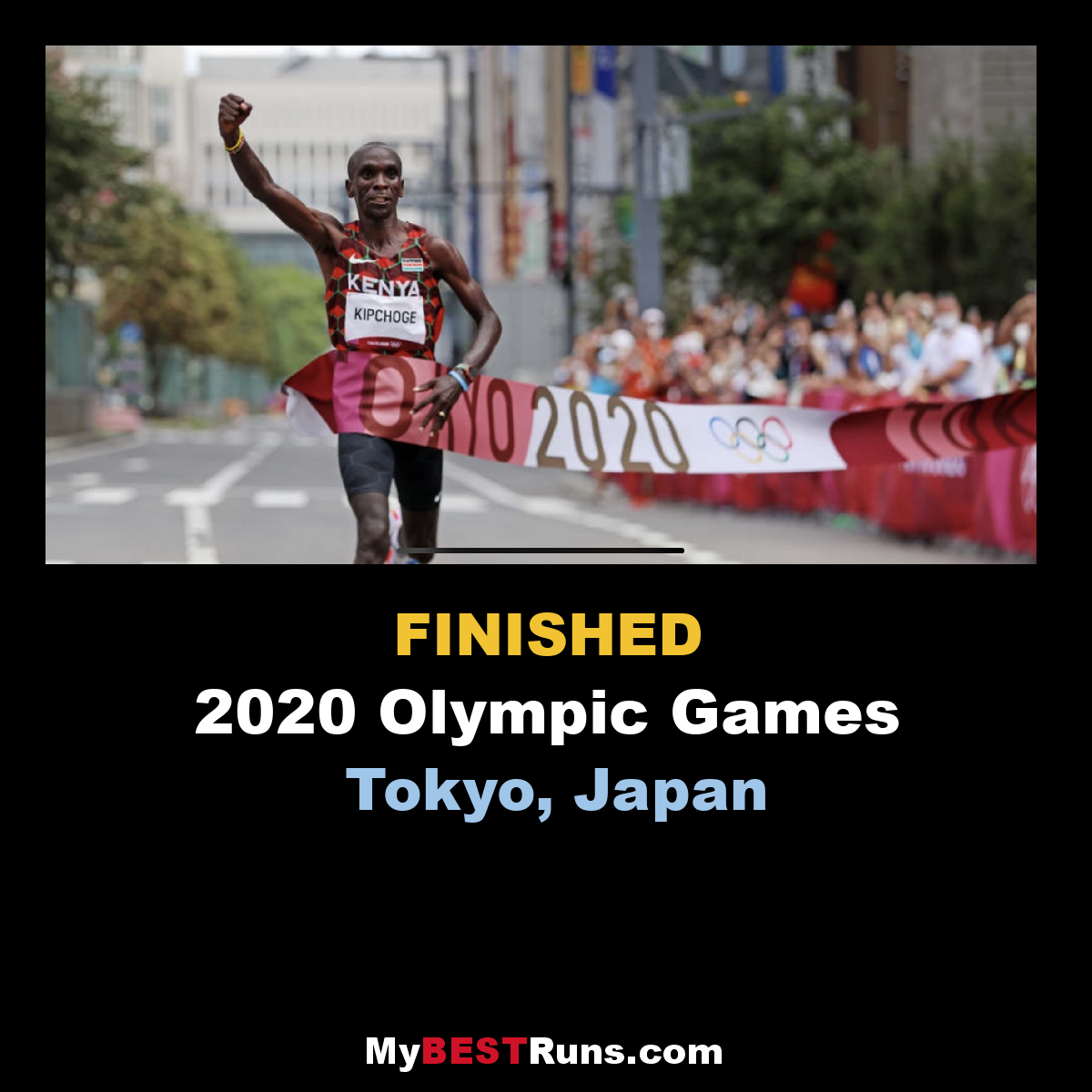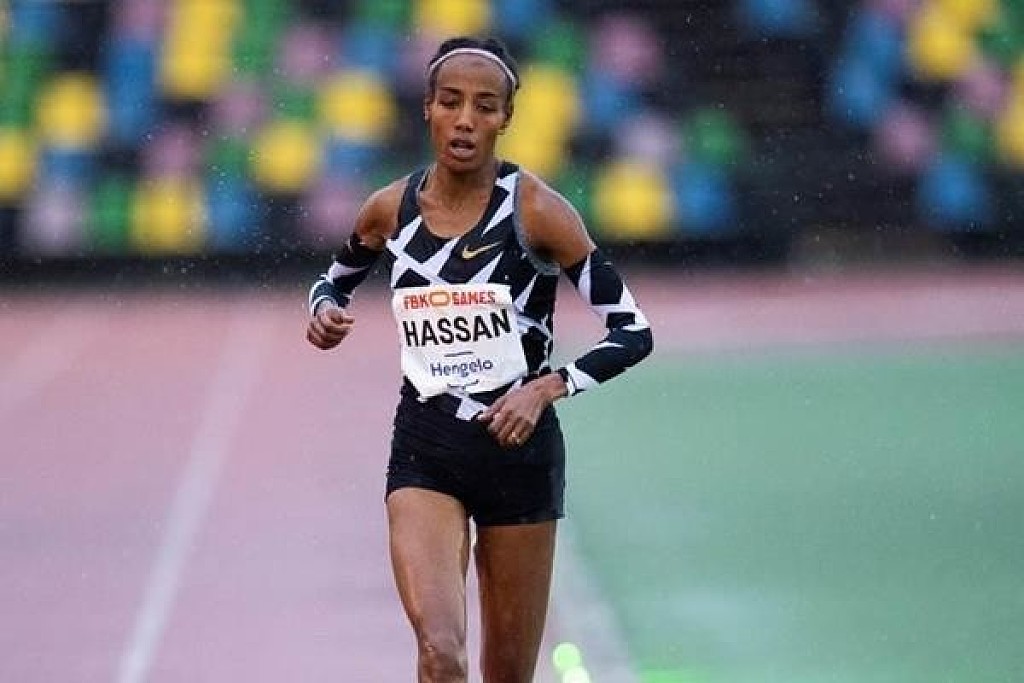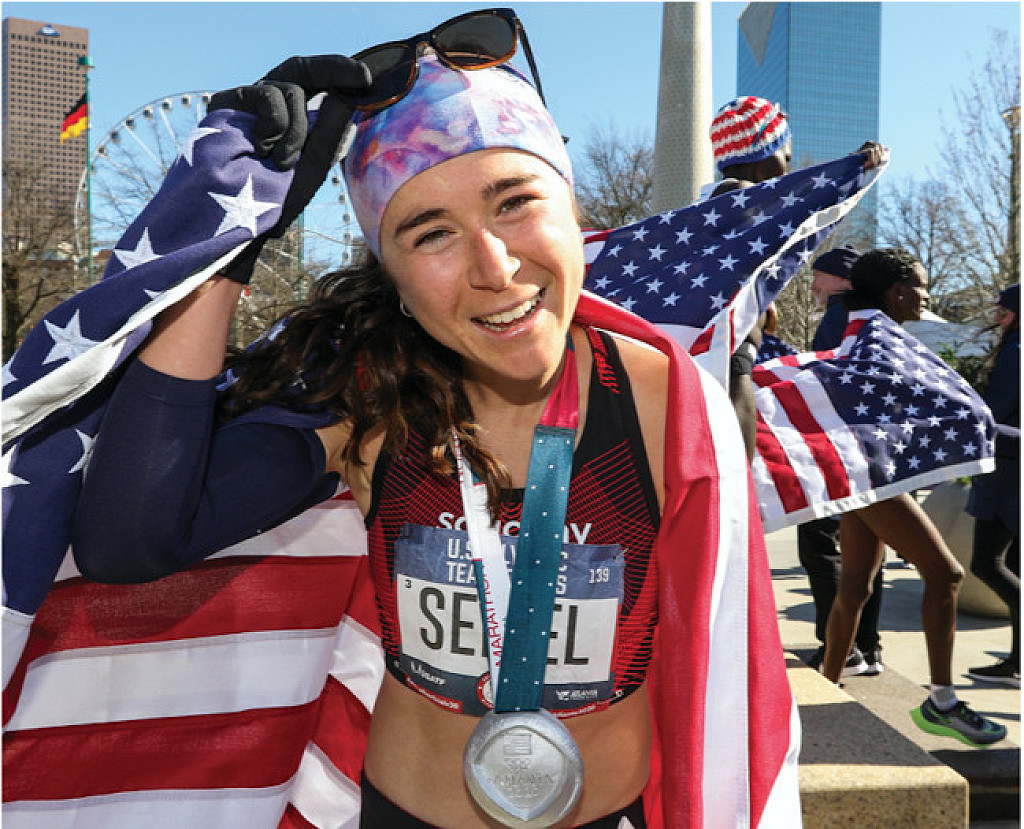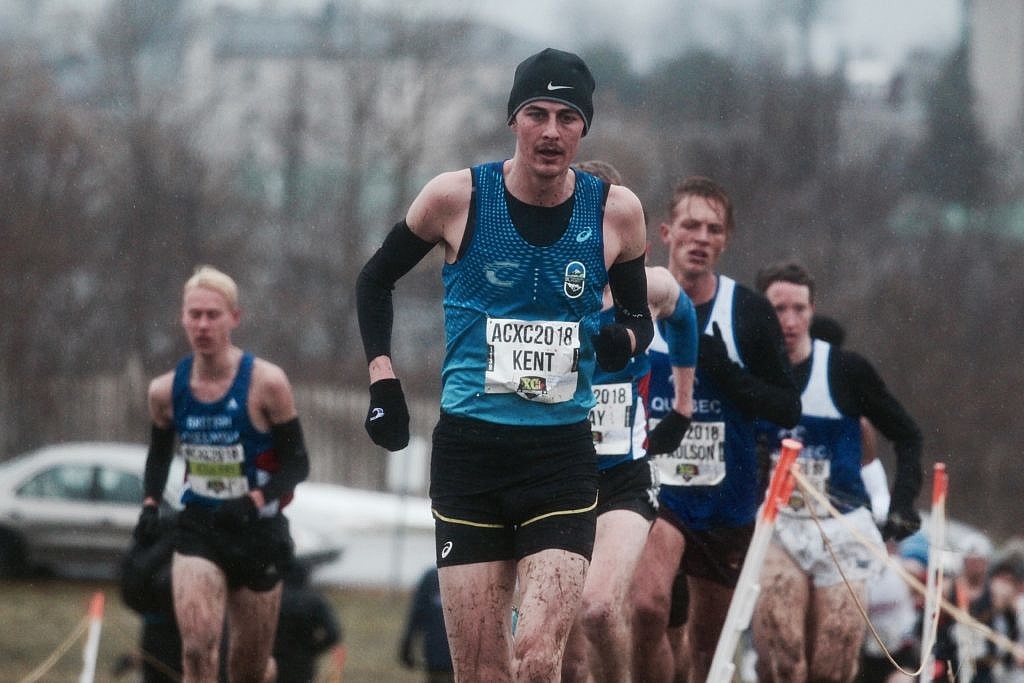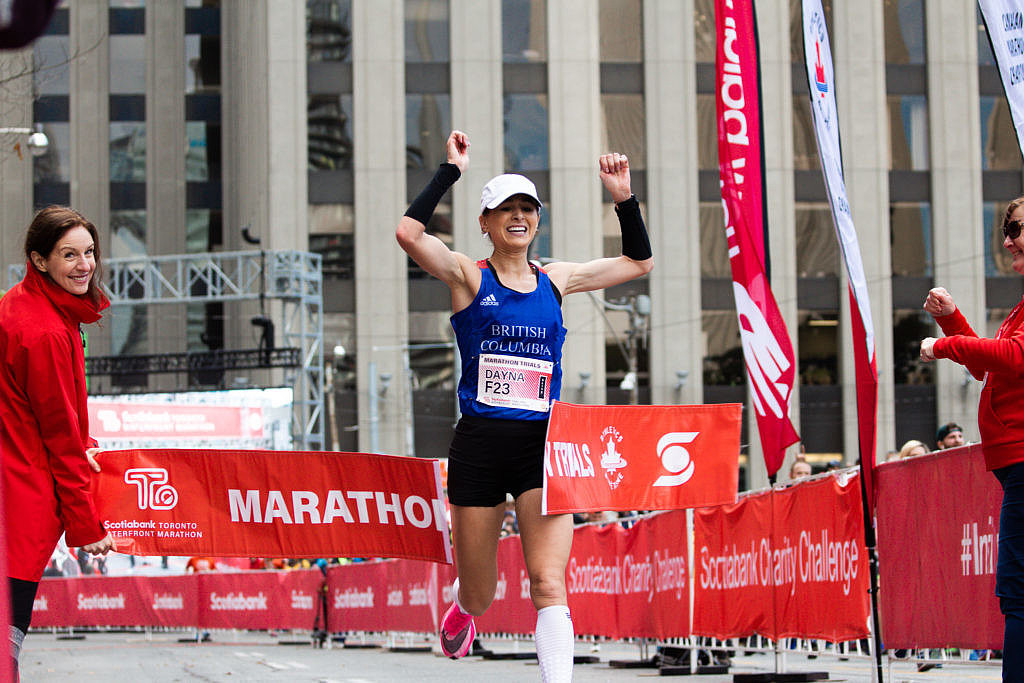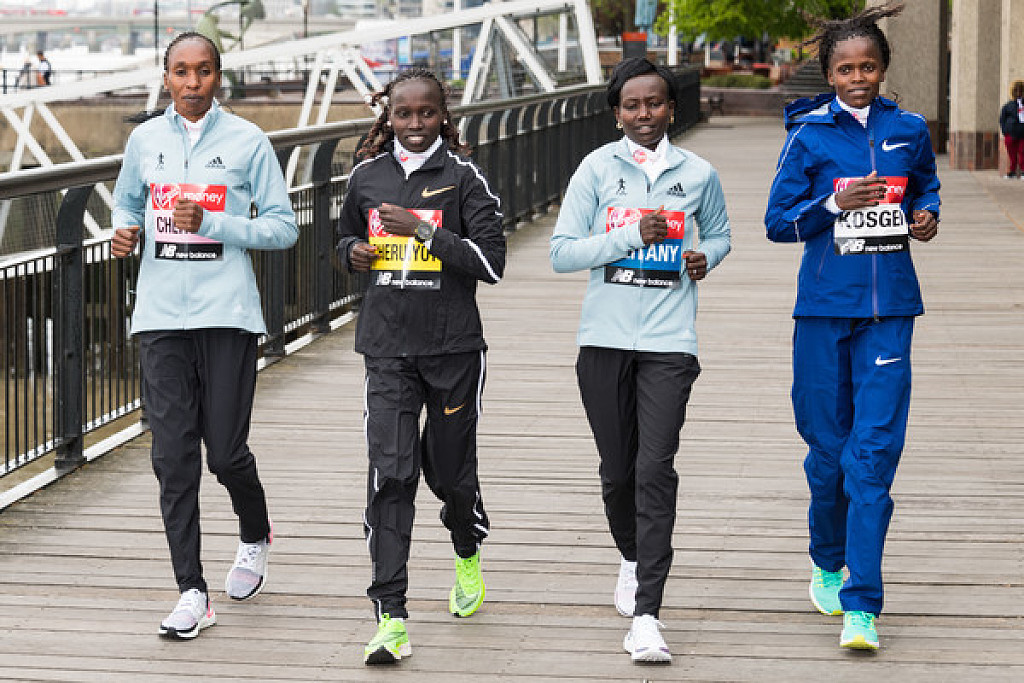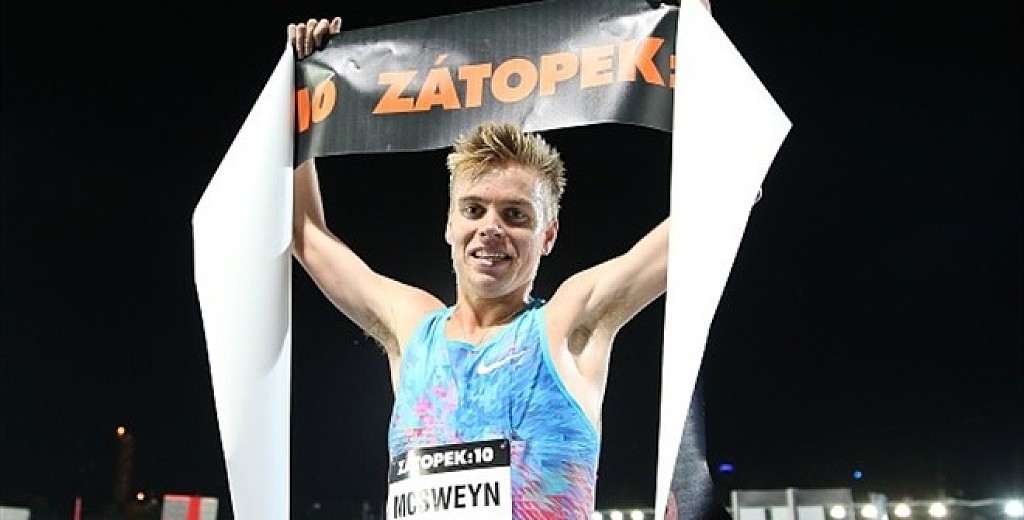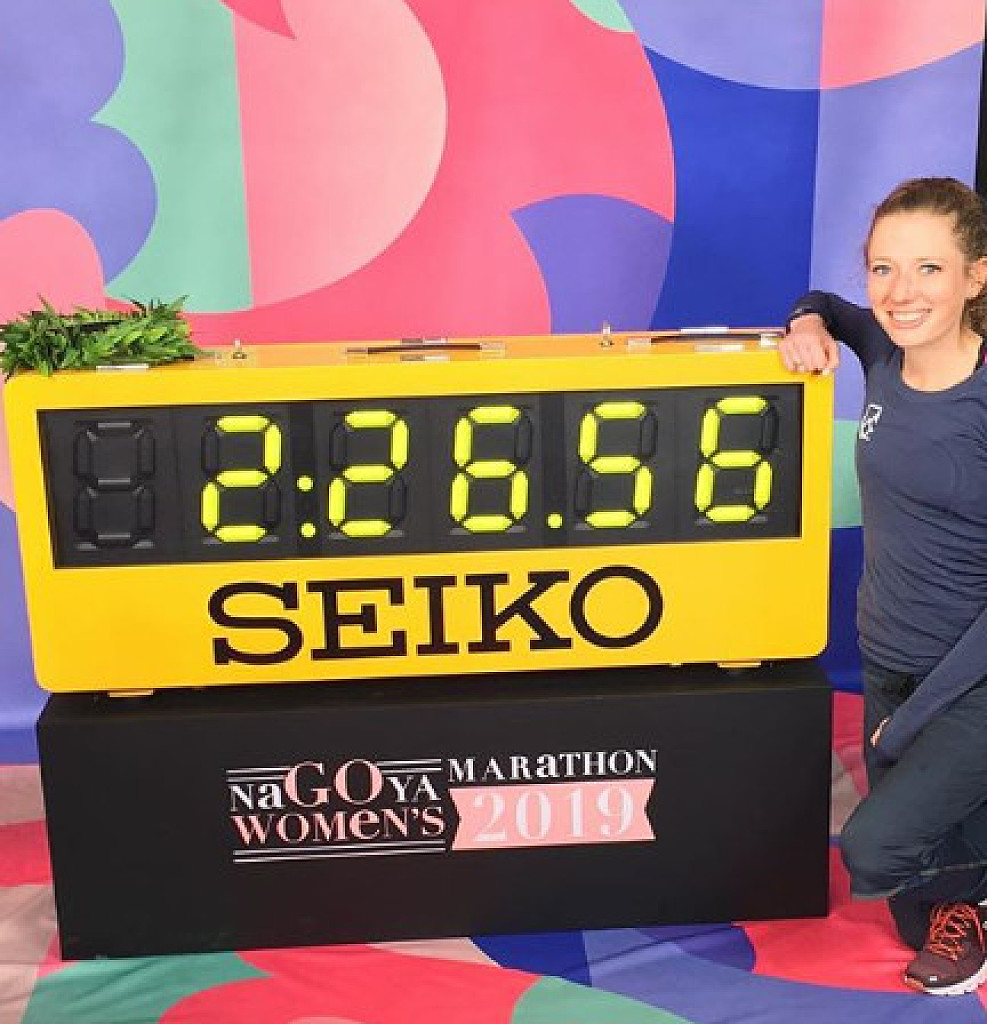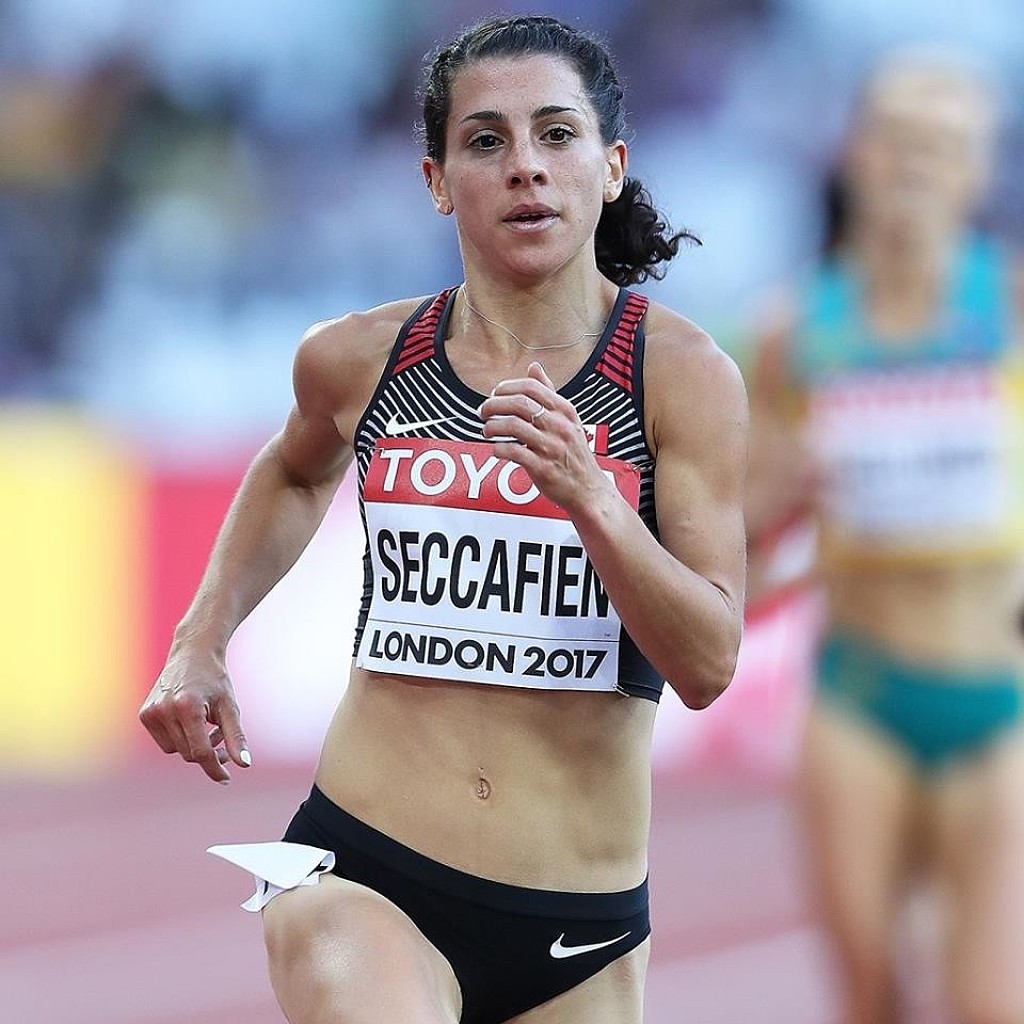Running News Daily
Running News Daily is edited by Bob Anderson. Send your news items to bob@mybestruns.com Advertising opportunities available. Train the Kenyan Way at KATA Kenya and Portugal owned and operated by Bob Anderson. Be sure to catch our movie A Long Run the movie KATA Running Camps and KATA Potato Farms - 31 now open in Kenya! https://kata.ke/
Index to Daily Posts · Sign Up For Updates · Run The World Feed
Articles tagged #Andrea Seccafien
Today's Running News
Canadian Olympian Andrea Seccafien to debut at Tokyo Marathon
After reaching the Tokyo Olympic 5,000m final in 2021, the next two years were a whirlwind for Canadian 10,000m record holder Andrea Seccafien. The 33-year-old suffered a root meniscus tear in early 2022, then a stress fracture in 2023, and at times, contemplated calling it a career to go back to school. She felt like she was missing something and had one final box to check as a runner: the marathon.
“The plan has always been to move up to the marathon,” says Seccafien. “I will be running the Tokyo Marathon on March 3.”
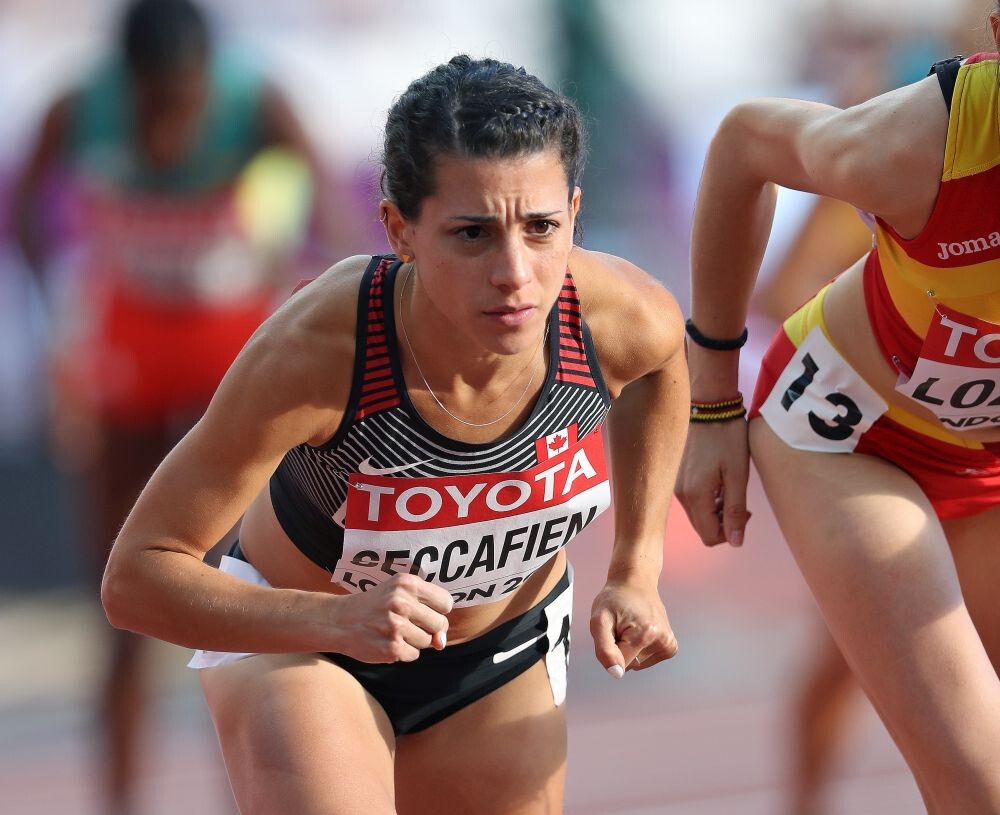
Seccafien told Canadian Running that she wants to be on the Canadian Olympic team for the marathon in Paris: “The Olympic standard [2:26:50] is the goal in Tokyo. I would not be running the marathon if my coach and I did not think it was possible.”
There were a lot of changes for Seccafien last year, who moved from Melbourne, Australia, to Portland, Ore., and back to Melbourne. She left Nike Bowerman Track Club in November 2023 after two years of training under coach Jerry Schumacher. She joined the group with fellow Canadian Lucia Stafford in November 2021 (who also subsequently left the club).
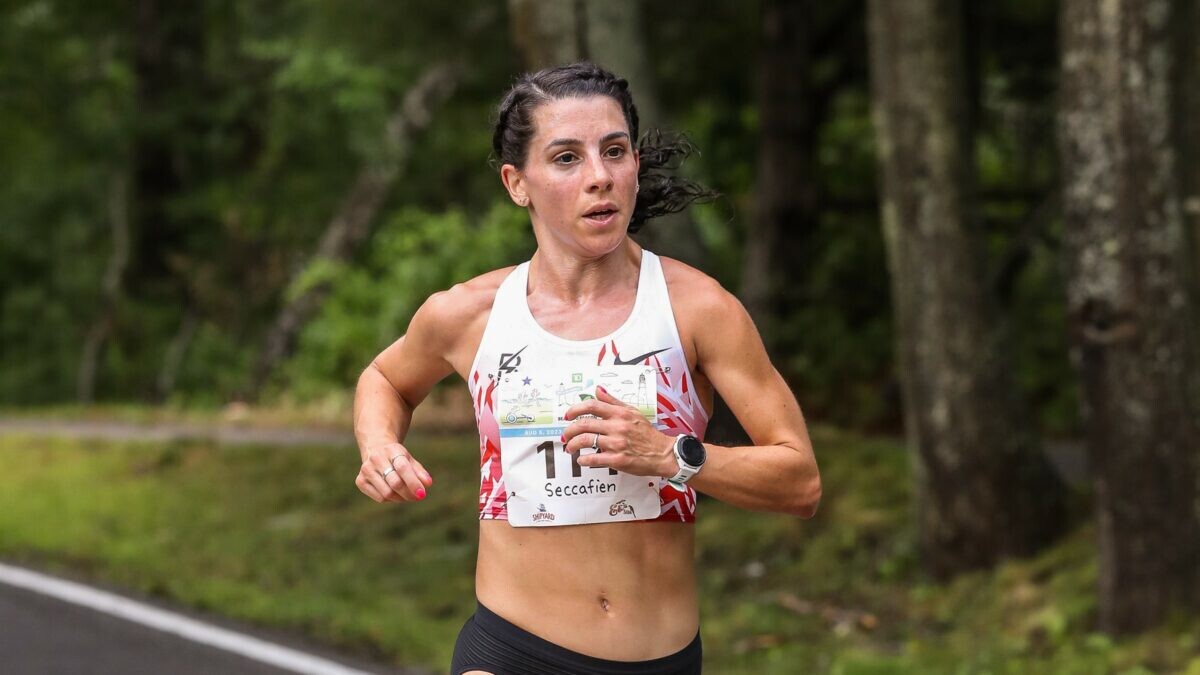
Seccafien says she left Bowerman on good terms. “It wasn’t anything with Jerry; I just did not have a community in Portland or Eugene,” she says. “My life was in Australia, and not in the U.S.” Seccafien is the ninth woman to leave Bowerman Track Club in the past two years, leaving the team with only two women on their roster, according to their website.
When asked about the downfall of the Bowerman team and the timeline around Shelby Houlihan’s doping suspension, Seccafien said that Gabriela DeBues-Stafford was the only athlete who left for that reason specifically: “No one else thought that way about Shelby,” she says. “Everyone in the club has been open with each other’s decision, and I think everyone left for many different reasons.”
“When I joined, I thought running the marathon there would work with Bowerman. Jerry doesn’t have time to coach a marathoner; you’d essentially be training on your own,” says Seccafien. Schumacher took a role with the Oregon Ducks group in Eugene, Ore. (two hours from Portland) while still coaching the Bowerman group. “It’s now a totally different environment than when I joined.”
Since returning to Melbourne, Seccafien has begun working remotely with Canadian physiologist and coach Trent Stellingwerff, who also coaches Olympians Natasha Wodak and DeBues-Stafford. “I wanted to find someone willing to coach me remotely and to give me some stability in my life again,” she says. “Trent calls the shots on mileage, and I just follow his plan. Our training is based more on intensity rather than miles.”
Seccafien says she now does most of her training on her own, with her partner, Jamie, occasionally joining her on the bike. “Like everyone, I’ve started doing double threshold workouts, and Jamie, who’s an exercise physiologist, will test my blood lactate.”
Seccafien told Canadian Running that training has not been easy. “There were a lot of lows. I felt like I had retired at times,” says Seccafien. “I could not put any load on my knee for four months to recover from my meniscus surgery… I could only swim, but could not kick my legs.”
She says it was great when she was finally able to run again, but shortly after, she got a stress fracture –another huge low. “Now, I’m just trying to stay consistent and take things as they come,” she says. Seccafien is seven weeks out from the 2024 Tokyo Marathon, where she will be in the elite field alongside Chicago and London marathon champ Sifan Hassan, whom Seccafien last ran against in the 5,000m final at the Tokyo Olympics (where Hassan won gold).
by Marley Dickinson
Login to leave a comment
Tokyo Marathon
The Tokyo Marathon is a world-renowned annual marathon held in Tokyo, Japan. As one of the prestigious Abbott World Marathon Majors, it attracts elite and amateur runners from around the globe. The race holds World Athletics Platinum Label status, recognizing its high competitive standards, top-tier organization, and international appeal. Sponsored by Tokyo Metro, the Tokyo Marathon has grown into one...
more...Canada names 57-strong team for Tokyo
World medallists Andre De Grasse and Damian Warner are among the 57 athletes selected for Canada’s team for the Tokyo Olympic Games.
De Grasse claimed three of Canada’s six medals at the Rio Games in 2016, securing 200m silver and 100m bronze, while also forming part of the bronze medal-winning men’s 4x100m team. Warner, meanwhile, added Olympic decathlon bronze to his two world medals and went on to claim another in Doha in 2019.
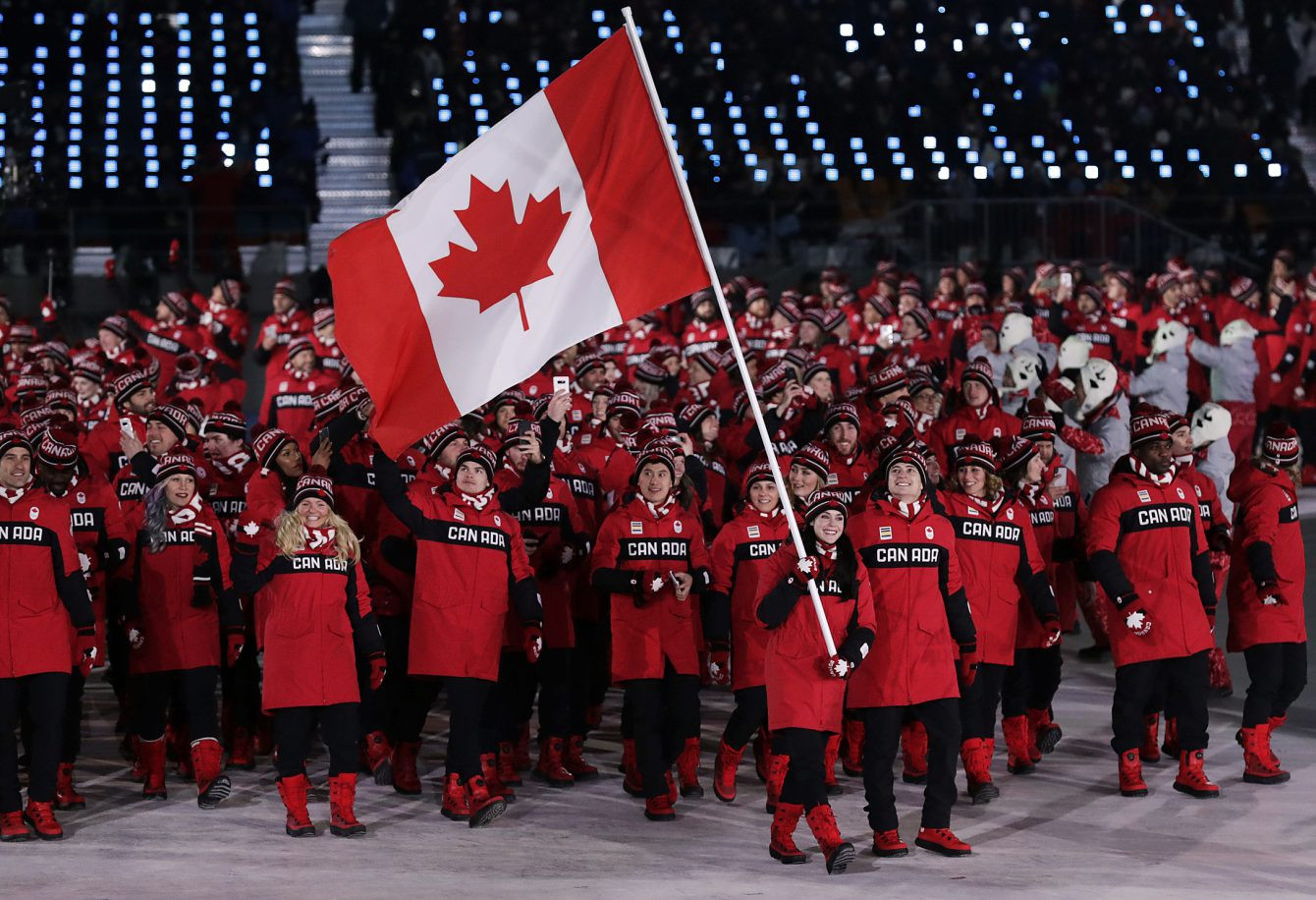
“It’s always an honour to represent my country on the world stage,” said De Grasse. “I’m really proud and excited to be going to my second Olympics Games. I look forward to making Canada proud.”
Warner, who heads to Tokyo as the top-ranked athlete in the men’s decathlon, said: “I’m really excited to go to Tokyo. It’s crazy for me to think that I went to the Olympics in 2012, 2016 and now I’m getting ready for my third Olympic Games.
“I couldn’t be more honoured to represent Team Canada and to go over to Tokyo with this talented group. I will have Pierce (LePage) with me in the decathlon, which will be awesome to have a teammate in the same competition. I’m just really looking forward to going over there and competing.”
Among those joining them in Tokyo will be 2016 Olympic 800m fourth-placer Melissa Bishop-Nriagu, Mohammed Ahmed, Gabriela DeBues-Stafford, Evan Dunfee and Sage Watson.
Malindi Elmore returns to Olympic Games action 17 years after she represented Canada in the 1500m in Athens, with the 41-year-old having broken the Canadian marathon record with 2:24:50 last year to achieve her place in the 26.2-mile event.
WOMEN
100m: Khamica Bingham, Crystal Emmanuel
200m: Crystal Emmanuel
400m: Kyra Constantine, Natassha McDonald
800m: Melissa Bishop-Nriagu, Lindsey Butterworth, Madeleine Kelly
1500m: Gabriela DeBues-Stafford, Natalia Hawthorn, Lucia Stafford
5000m: Andrea Seccafien, Julie-Anne Staehli, Kate Van Buskirk
10,000m: Andrea Seccafien
Marathon: Malindi Elmore, Dayna Pidhoresky, Natasha Wodak
3000m steeplechase: Alycia Butterworth, Genevieve Lalonde, Regan Yee
400m hurdles: Noelle Montcalm, Sage Watson
Pole vault: Anicka Newell, Alysha Newman
Long jump: Christabel Nettey
Shot put: Brittany Crew, Sarah Mitton
Javelin: Elizabeth Gleadle
Hammer: Camryn Rogers, Jillian Weir
Heptathlon: Georgia Ellenwood
4x400m: Alicia Brown, Kyra Constantine, Lauren Gale, Natassha McDonald, Noelle Montcalm, Madeline Price, Sage Watson
MEN
100m: Bismark Boateng, Andre De Grasse, Gavin Smellie
200m: Aaron Brown, Andre De Grasse, Brendon Rodney
800m: Marco Arop, Brandon McBride
5000m: Mohammed Ahmed, Lucas Bruchet, Justyn Knight
10,000m: Mohammed Ahmed
Marathon: Trevor Hofbauer, Cameron Levins, Ben Preisner
50km race walk: Mathieu Bilodeau, Evan Dunfee
3000m steeplechase: John Gay, Matthew Hughes
High jump: Django Lovett, Michael Mason
Shot put: Timothy Nedow
Decathlon: Pierce LePage, Damian Warner
4x100m: Bolade Ajomale, Jerome Blake, Bismark Boateng, Aaron Brown, Andre De Grasse, Brendon Rodney, Gavin Smellie
by World Athletics
Login to leave a comment
Canadian record-holders Levins, Elmore headline Canada's marathon team for Tokyo
Seventeen years after she last raced at the Olympics, distance runner Malindi Elmore has earned a spot on Canada's team for Tokyo, while Cam Levins will race at the Games after dipping under the qualifying mark with just a week to spare.
The two Canadian record-holders in the marathon highlighted Athletics Canada's team of long-distance runners and race walkers nominated on Friday.
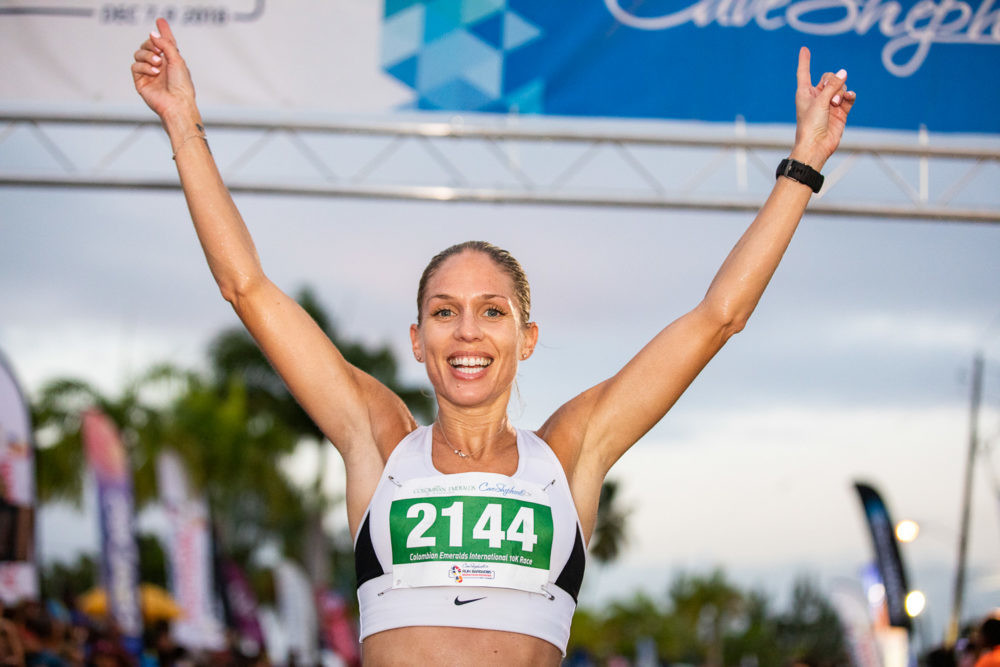
Nine Canadian marathoners had achieved the qualifying criteria in the marathon, but each country is allowed only three men and three women, leading to speculation about the squad in recent weeks, and posing a good problem for Athletics Canada with the depth of talent.
"Over the past few years, Canadian middle- and long-distance runners have accomplished great things on the track and on the road," Athletics Canada's head coach Glenroy Gilbert said in a statement. "In Tokyo, we'll see a new generation of marathoners who have broken Canadian records, established impressive personal bests on-demand in less-than-ideal conditions and made a name for themselves in the gruelling 42.195-kilometre event.
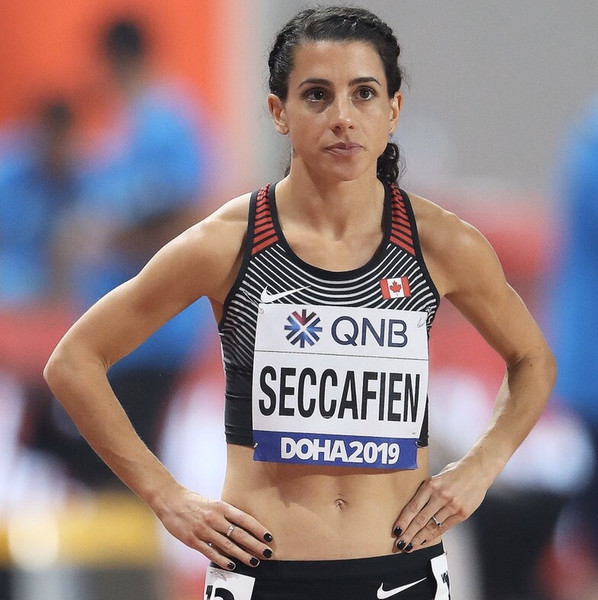
"We are excited to see what this group can do in Sapporo against the greatest athletes in the world, as they deserve to be there."
World bronze medallist Evan Dunfee tops the race-walk team, while Mohammed Ahmed and Andrea Secdafien earned spots in the 10,000 metres.
The rest of Canada's track and field team will be announced at a later date.
Dunfee had already clinched his spot on the team based on his bronze at the 2019 world championships, while Dayna Pidhoresky and Trevor Hofbauer had previously earned automatic berths after winning the women's and men's Canadian marathon titles.
Elmore is a terrific comeback story. The Kelowna, B.C., native ran the 1,500 at the 2004 Athens Olympics missing the semifinals by one spot, then retired from track in 2012 and became a world-class Ironman triathlete. Moving down to the marathon in 2019 — as a mom of two, she said it requires less training time than the Ironman — she broke the Canadian marathon record in January 2020.
Natasha Wodak, who's raced at three world championships in the 10,000 metres, is the third Canadian woman on the marathon team.
Levins, a finalist in the 5,000 and 10,000 at the 2012 London Olympics, shattered the Canadian record in his marathon debut in 2018. He fell short on two attempts over the past year to qualify for Tokyo, but the 32-year-old from Black Creek, B.C., finally dipped under the mark on May 23 — a week before the qualifying window closed — in Styria, Austria, despite running in rain and alone for the last 25 kilometres of the race.
Ben Preisner is the third men's marathoner nominated to the team.
"I am so pumped about this group of athletes," said Canada's chef de mission Marnie McBean. "They chose the 'suffer' events and make them look easy. Many of their recent results have been a beacon of light for the whole of Team Canada."
Mathieu Bilodeau joins Dunfee in the 50-kilometre race walk based on his world ranking.
The marathons and race walk events will be held in Sapporo due to Tokyo's heat, and because of COVID-19, athletes will be restricted to staying in Sapporo.
"Woohoo! Stellar Sapporo crew locked in," tweeted Dunfee, who was fourth at the 2016 Rio Olympics. "We'll be the only Team Canada teammates we see at the Olympics, sequestered 800km away, so I'm stoked that these people are all so lovely."
Mohammed Ahmed and Andrea Seccafien were nominated in the men's and women's 10,000. Ahmed owns the Canadian records in the 5,000 and 10,000 and won bronze in the 5,000 at the 2019 world championships. Seccafien broke the Canadian record in the 10,000 just three weeks ago.
The window to qualify in the 10,000 remains open for another month, so Canada could add runners in that distance based on either their world ranking or by achieving an automatic entry standard.
by Canadian Press
Login to leave a comment
Tokyo 2020 Olympic Games
Fifty-six years after having organized the Olympic Games, the Japanese capital will be hosting a Summer edition for the second time, originally scheduled from July 24 to August 9, 2020, the games were postponed due to coronavirus outbreak, the postponed Tokyo Olympics will be held from July 23 to August 8 in 2021, according to the International Olympic Committee decision. ...
more...World record-holders ready to clash in Hengelo
Five world champions, four Olympic gold medallists and two world record-holders are set to compete at the FBK Games – a World Athletics Continental Tour Gold meeting – in Hengelo on Sunday (6).
Pole vault world record-holder Mondo Duplantis will be raring to go after his 23-meet winning streak came to an end at the Wanda Diamond League meeting in Gateshead at the end of last month. Battling tough conditions, the 21-year-old from Sweden gave the bar a slight nudge on his final attempt at 5.80m – what would have been a winning height – and it came down, meaning victory went to two-time world champion Sam Kendricks.
Kendricks won’t be in Hengelo, but Duplantis will have one eye on the US vaulter’s meeting record and Dutch all-comers’ record of 5.91m.
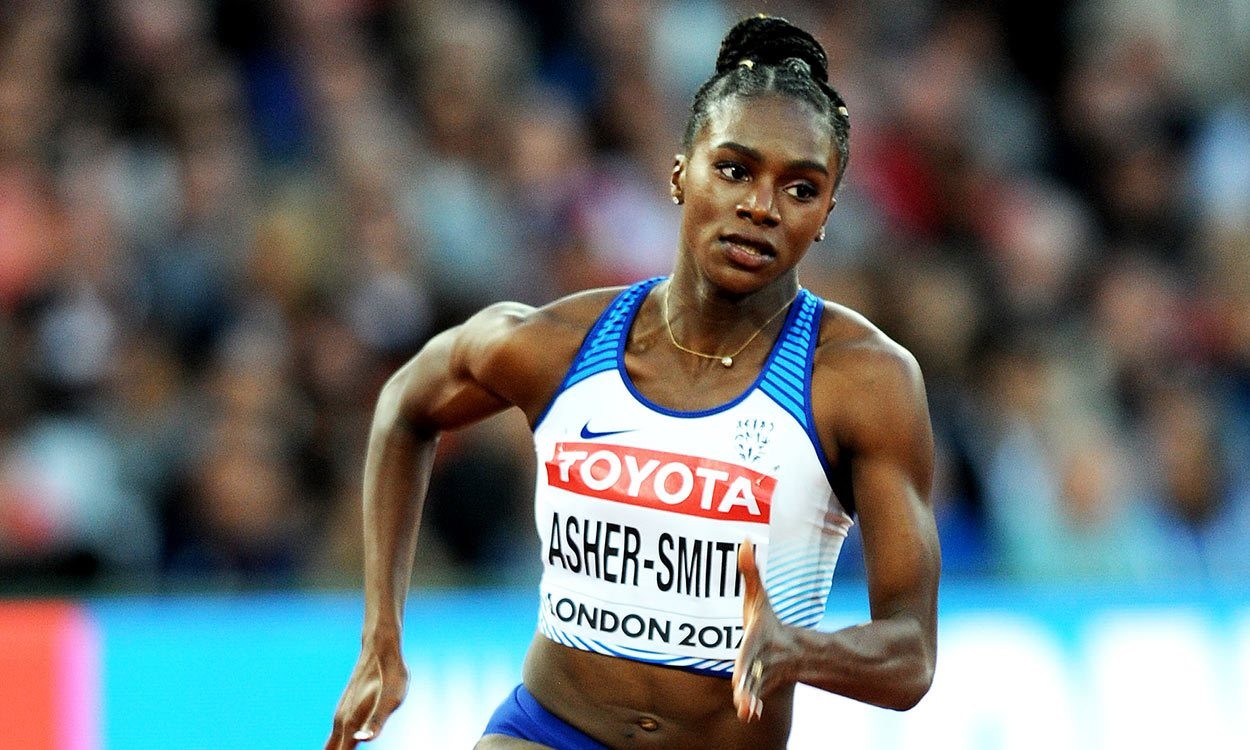
Olympic champion Thiago Braz and Dutch vaulter Menno Vloon, who set a national indoor record of 5.96m earlier this year, are also in the line-up.
Double world champion Sifan Hassan will return to the track on which she set a European 10,000m record of 29:36.67 last year and will again contest the 25-lap discpline. The Dutch distance runner has tested her form over a range of distances this year, clocking 8:33.62 for 3000m indoors, followed by 14:35.34 for 5000m and 2:01.54 for 800m outdoors.
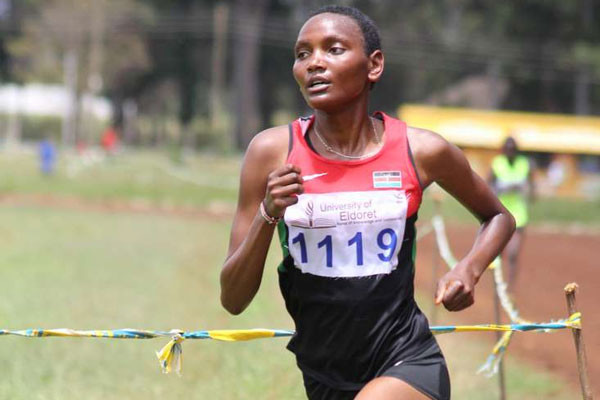
Kenya’s Daisy Cherotich, New Zealand’s world finalist Camille Buscomb and Canada’s Andrea Seccafien will all be hoping to emerge from the race with lifetime bests.
World 800m champion Halimah Nakaayi will open her 2021 campaign over her specialist distance. The Ugandan middle-distance runner takes on a quartet of Britons – Laura Muir, Kelly Hodgkinson, Jemma Reekie and Adelle Tracey – as well as Norway’s Hedda Hynne and France’s Renelle Lamote.
In the men’s event, indoor sensation Elliot Giles lines up for his first outdoor 800m of the year, taking on fellow Brits Max Burgin – who set a European U20 record of 1:44.14 in Ostrava last month – and Daniel Rowden. Tony van Diepen, one of the Netherlands’ top performers at the World Athletics Relays Silesia 21, is also in the field.
Recent Montreuil winner Abel Kipsang goes in the men’s 1500m where he’ll take on Uganda’s Ronald Musagala and Britain’s sub-3:30 performer Jake Wightman.
Asher-Smith, Kerley and McLeod set to produce sprint highlights
Although she has raced there only once before, world 200m champion Dina Asher-Smith has fond memories of racing in Hengelo.
It is where, as a teenager back in 2015, she set her first senior national record over 100m, clocking 11.02. Six years on from that performance, and having bagged many more records and medals, the world 200m champion will be hoping for a sub-11-second clocking to improve on the 11.35 season’s best she recorded when winning in Gateshead, running in heavy rain and into a -3.1m/s headwind.
Nigeria’s world and Olympic medallist Blessing Okagbare, who has a season’s best of 10.90, and two-time world 200m champion Dafne Schippers are also in the line-up.
World 4x400m champion Fred Kerley has so far this year produced his most impressive performances at 100m, clocking 9.91 and 9.96 in recent weeks. In Hengelo, however, he’ll step back up to his specialist 400m discipline and will aim to improve on the 44.60 season’s best he recorded in Doha last week.
by World Athletics
Login to leave a comment
None of us would dispute that running makes us happy. But it's also clear that it's not a panacea
“It was running or Zumba,” says James Duncan of Montreal (not his real name), when asked why he started running. Back in 2018, when he first experienced symptoms of depression and anxiety, a friend suggested he take up a new activity. He was attracted to running as an individual sport without too much pressure: “No one expects me to win, so it seemed like a good option,” he says. But Duncan quickly discovered he could do more than he thought, so he registered for his first 5k race. “It gave me a sense of achievement, some sort of purpose,” he says. “It forced me to get up on days when I just wanted to stay in bed.”
Cut to June 2020, when Duncan proudly ran his first unofficial (and entirely unplanned) half-marathon – in the middle of the night. Getting up at 3:30 a.m. after a bout of insomnia, he went out for a quick run to watch the sunrise over the St. Lawrence River, and had his first runner’s high: “It just felt good,” he says. “So I kept running.”
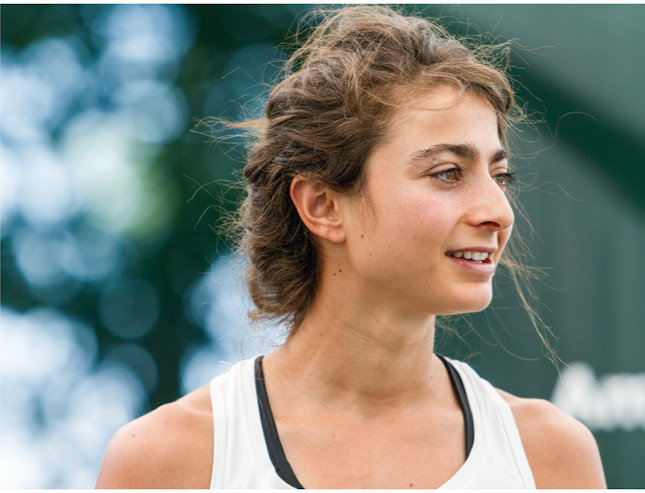
Is runner’s high what kept him running over the past two years? Duncan is clear: “To be honest, that’s only ever happened to me once. Running gives me a way to stop thinking about everything else for a while. When I run, I just focus on my breathing. It’s almost like meditation. And the social connections I got from being part of a running group also really helped me.”
Although thousands of people have taken up running for the first time during the pandemic, COVID has put a damper on group running, so the mental-health boost from socializing with other runners has been absent for most people over the past year. This has given rise to a particularly COVID-specific type of mental distress: loneliness. A recent Angus Reid survey found that almost a third of Canadians report suffering from loneliness and social isolation – and this figure rose 10 per cent between October 2019 and October 2020. (Those reporting that they had “a good social life” dropped from 55 per cent to 33 per cent during the same period – and there are probably a fair number of runners among those numbers.)
With the prospect of a gradual return to normality thanks to vaccination, runners are tentatively signing up for races (where they can find them) and reconnecting with their groups, while solo runners whose motivation to train never flagged are cheered by the approach of spring. Research has repeatedly demonstrated the many mental health benefits of running and exercise, and that has never been truer than now.
But running obviously isn’t a guarantee against anxiety, depression or loneliness. Runners of all levels struggle with mental health issues, while also experiencing running as a mood-booster, at least some of the time. Elite athletes like Canadian ultrarunner Rob Krar, U.S. runners Alexi Pappas, Amelia Boone and Molly Seidel have shared their experiences with anxiety, depression, obsessive compulsive disorder (OCD) and eating disorders in an effort to reduce stigma, and their candour has led to recognition of the need for dedicated support. And while mental performance coaches have for decades helped pro athletes deal with negative mental habits that impede performance, there’s a difference between mental performance and mental health; psychotherapists are only recently becoming an essential part of the team as well. This was brilliantly demonstrated in April last year as Canadian sports groups and associations united to create a dedicated mental health task force to support athletes after the postponement of the Tokyo Olympics. All of which raises the question: if elite professionals, who spend a large portion of their days training, are experiencing anxiety and depression, is exercise really as beneficial for mental health as we thought?
The relationship between running and mental health is both subtle and complex. Multiple studies have demonstrated the crucial role of exercise in well-being. Sport psychology expert, Olympian and dean of the University of Calgary’s faculty of kinesiology, Penny Werthner, says, “Movement is critical for both mental and physical health. There are physiological and neurological changes that occur when we move, when we run and become fitter.” Achieving running milestones (which, depending on the individual, may mean anything from simply getting out the door to setting a new marathon PB) can boost confidence and motivation, foster a sense of accomplishment and improve self-esteem – all of which boost mental health. But it’s only part of the picture: “I would argue that exercise and movement can always help,” says Werthner, “and it would be wise to incorporate them into a treatment plan, along with other treatments, such as cognitive behaviour therapy.”
HOW NEW RUNNERS CAN BENEFIT
If you’re a new runner who’s embraced the sport because you’ve heard of its widely touted mental health benefits, it may not be quite that simple. It may take time to build up the fitness that will allow you to reap any significant mental health benefit. (One study found that running at a moderate pace for 30 minutes produces a much higher increase in the neurotransmitters known as endocannabinoids, which researchers believe may be more responsible for running’s mood-boosting properties than endorphins, than either walking or running at maximum intensity – and it may take some time for a non-runner to be able to run continuously for 30 minutes.) Obviously, the risk for new runners is taking on too much too soon, which is likely to deprive them of any mental health benefit they might have derived from running because they are sidelined with an injury. Werthner suggests reaching out to a trainer or coach to get started in a way that’s appropriate to your fitness level and goals.
Another pitfall for new runners is that running can very easily become a chore, adding nothing to one’s mental health (and possibly compromising it). For running to make you happy, it should be carefree and liberating (as it is for Duncan). It doesn’t mean having to run a marathon – by all means, start training for a marathon if all of the following are true: you’re healthy, that goal excites you and you have support for it from the people in your life whom it may impact. Marathon training and recovery are time-consuming. Most plans recommend starting with some 5k, 10k and half-marathon races to build a base of fitness, which generally means putting off marathon training until you’ve been running for at least six months to a year. Don’t compare yourself to others you see on social media, posting about their running accomplishments, and remember that there are no shortcuts to athletic greatness – elite athletes have years of training (and plenty of failures) behind them.
Whether you start with a few minutes of running and walking or a more ambitious regimen, check in with yourself regularly. “The best gift you can give yourself is to be aware of your own needs,” says Kim Dawson, mental performance consultant and professor at Ontario’s Wilfrid Laurier University.
EXPERIENCED RUNNERS: BALANCE IS KEY
Experienced runners who decide to take on a new running goal may also be at risk of biting off more than they can chew, says Dawson, who suggests runners think carefully about the possible mental health implications of a new training plan: “Be aware of what you are sacrificing,” she says. “Choose a running program that fits your lifestyle and allows for a healthy amount of training, while giving you room for growth in other areas of your life, such as your professional development, social connections and emotional well-being.” While often challenging, running should still be fun, at least most of the time. Regularly ask yourself whether you still look forward to getting out for a run. If not, it may be time to take the intensity down a notch or find a challenge more suited to your current state of mind.
DEALING WITH INJURY
Healing an injury can be a long, emotionally difficult process that sometimes involves giving up short-term goals, such as a much-anticipated race. That is likely to have an impact on your mental health, at least in the short term. The pandemic certainly hasn’t made dealing with injury easier. Being forced to take a break from a much-enjoyed activity is hard enough; doing it without the mood-boosting brain chemicals provided by alternative forms of exercise at facilities that aren’t accessible during lockdown can make recovery that much more difficult. Once again, Dawson suggests focusing on the other areas of your life that bring you joy. It also helps to seek out a supportive friend, or possibly a mental health professional, with whom to talk about the situation.
WHEN RUNNING IS PART OF THE PROBLEM
Finding balance may be a particular challenge for pro runners, for whom training is the biggest part of their daily life. Canadian half-marathon record holder Andrea Seccafien is from Guelph, Ont. but lives and trains in Melbourne, Australia. For Seccafien, feelings of isolation during the first lockdown in 2020, when she couldn’t work out with her teammates and she was a long way from home, were compounded by anxiety about the virus. That impacted her performance, which led to further anxiety, which led to the decision to take a month-long break from the sport last May. “I so badly wanted this to be a physical problem,” Seccafien told Canadian Running in January 2021, adding that she was prepared to deal with an iron or thyroid deficiency. But healing a mental health injury is no different than healing a running injury, and the solution usually isn’t more running, but its opposite – rest. (And treatment by a trusted health professional.)
Alexi Pappas, who was raised in the U.S. but hopes to run for Greece at the Tokyo Olympics, has a similar story, which she tells in her recent book, Bravey: Chasing Dreams, Befriending Pain, and Other Big Ideas. Pappas’s mental health took a nosedive after the 2016 Olympics, where she competed in the 10,000m, setting a new national record for Greece. Instead of taking a well deserved and much needed vacation before setting new goals for the next Olympic cycle, she felt compelled to continue training. And after getting a distribution deal for her first film, Tracktown, she felt pressure to produce another film. There were also deeper psychological issues having to do with her mother’s death by suicide when Pappas was a young child, and she spiralled into insomnia and depression. It was a year before her father finally persuaded her to seek treatment, which was ultimately effective.
Professional athletes have the added pressure of having their performance tied to their livelihood, but recreational runners are not immune to overdoing it to the point of burnout. “The key,” says Dawson, “is to maintain a holistic identity. And this is valid for everyone, professional athlete or not. You are a person first, who happens to run.” It’s important to keep developing other areas of your life, which may include time with family, building a career or pursuing another hobby that you’re passionate about.
Duncan, for his part, still runs four to five times a week and regularly attends therapy sessions. “It’s not a magic pill,” he says of running. “You have to find out what works for you. But it’s definitely been an adventure. You never know where you’re going to end up.” He smiles. “Could be on a riverbank, watching the sun rise at 6 a.m. after running 21 kilometres.”
by Apple News
Login to leave a comment
Canadian Justin Kent and Natasha Wodak continue stellar seasons ahead of December marathon
Despite having limited opportunities to race this year, Justin Kent and Natasha Wodak have had great seasons. The pair of B.C. runners have both run half-marathon PBs in 2020, they took the wins in the virtual Canadian 10K Championships in July and they’re both headed to Arizona in December to compete in the Marathon Project with some of the top marathoners in North America.
Over the weekend, they added another couple of big results to their lists of accomplishments for 2020, with Kent breaking the Canadian 20,000m track record in 1:01:01 on Saturday and Wodak coming close to the national half-marathon record with a 1:10:01 showing at the Fierce Half Marathon in B.C. on Sunday.
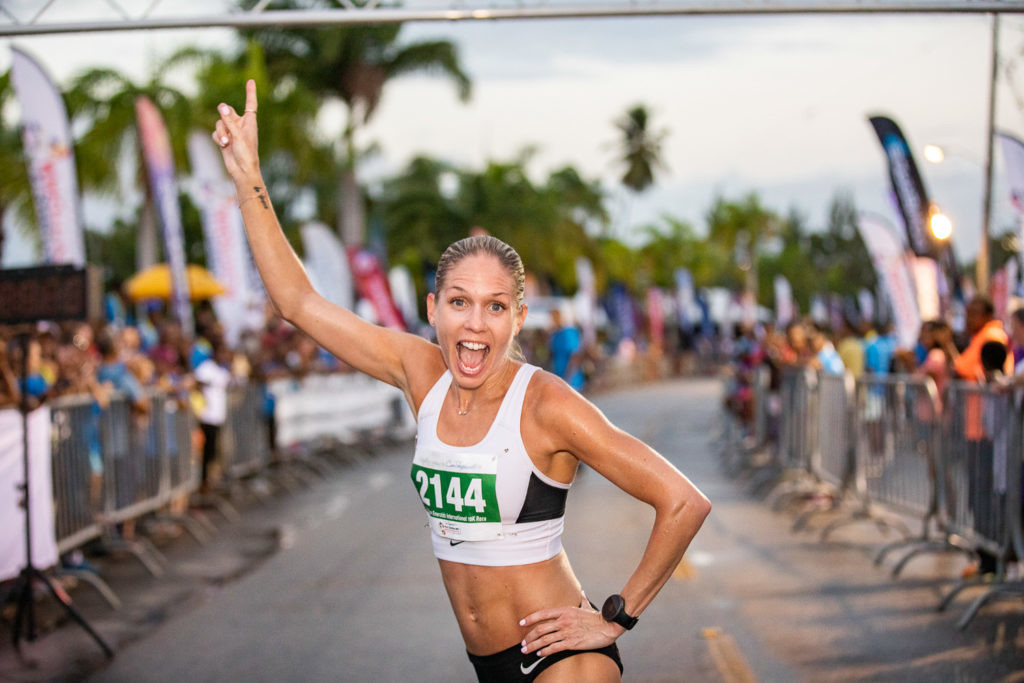
Kent’s 20,000m record
Kent’s 20,000m best is his first Canadian record. Tom Howard was the previous record-holder in the 20,000m with a time of 1:01:10, which he set in 1974. Kent’s result works out to an average pace of 3:03 per kilometre, and while this was on the track and not the road, the result is proof that he’s in tremendous form with just over a month to go until the Marathon Project, which is set for December 20. The race will be his debut marathon, and he’ll undoubtedly be chasing the Olympic standard of 2:11:30.
Kent was supposed to run for Team Canada at the World Athletics Half Marathon Championships in Poland in October, but Athletics Canada pulled out of the race just days before it was held due to health and safety concerns. In lieu of the world championships race, he ran a solo half-marathon and set his PB of 62:34. With that result and his shiny new Canadian record, Kent will be a runner to watch at the Marathon Project and beyond in 2021. â£â£
Wodak’s near miss
Earlier in 2020, Wodak became the first Canadian woman to run sub-1:10 in the half-marathon when she ran a 1:09:41 at the Houston Half Marathon in January to set the national record in the event. She only got to enjoy the record for two weeks, though, because in February, Andrea Seccafien ran 1:09:38 at a race in Japan, which is the current Canadian best. Wodak, who owns the 10,000m national record with a time of 31:41.59, was looking to lower the half-marathon bar once again at the Fierce Half Marathon on Sunday, but she came up just short. Still, her 1:10:01 is the third-fastest time in Canadian history, and if she had run it in any other year, it would have been the national record.
Even though she couldn’t beat Seccafien’s time on Sunday, this result is a good sign for Wodak, and it looks like she is in great form just six weeks out from the Marathon Project. Unlike Kent, Wodak has run a marathon before, but just once — seven years ago when she posted a 2:35:16 at the Scotiabank Toronto Waterfront Marathon in 2013. This is basically her Debut 2.0 at the distance, and based on her last few years of results, it would be safe to bet that she will smash her marathon PB. Wodak will have her eye on the Olympic standard of 2:29:30 in Arizona, and she’ll have dozens of the best road runners in North America to work with as she chases that time.
by Ben Snider-McGrath
Login to leave a comment
Runners and competitive hotdog eaters have more in common than you think
A closer look at the intersection between competitive eating and competitive running
When pondering the upper limit of how many hotdogs one person could possibly eat 10 minutes, James Smoliga, professor of physiology at High Point University in North Carolina, looked to running statistics for the answer. He told As It Happens host Nil Köksal on Thursday that running, specifically the trajectory of marathon world records, was a key inspiration for creating a mathematical formula to determine how many hotdogs a human can eat in 10 minutes.
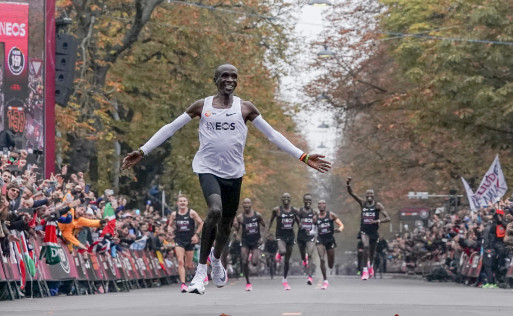
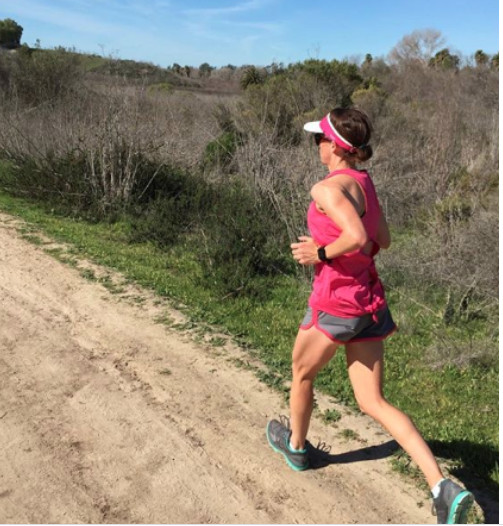
At first glance, the two pursuits have little in common, but Smoliga explained to CBC that the principles are, in ways, quite similar. “When I was reading some of the literature and some of the mathematical models trying to estimate these types of things … it occurred to me that the patterns that we see in track-and-field type of athletes … are actually very similar to what I suspected the Coney Island hotdog eating contest would reveal.”
He says the rate at which people can consume hotdogs has increased with a similar trajectory to how quickly people can run marathons.
It’s a combination of talent and training
As with any sport, the ability to scarf down 75 hotdogs in 10 minutes (the current world record) or run a marathon in under two hours, is a combination of talent and training – you can’t accomplish either feat without both. Not just anyone gets to become Eliud Kipchoge when they grow up.
As many have noted, Kipchoge trains with precision and purpose that’s unmatched by almost any other runner in the world. The best hotdog eaters would need to train their stomachs in a similar manner.
The way runners hypothesized about the sub-two hour marathon, hotdog eaters are thinking about the 84-dog barrier. Right now, it’s nine hotdogs beyond the world record, but like in running, Smoliga believes people will rise to the occasion.
It was only one year ago that a sub-two hour marathon still sounded like science fiction. Now that two men (Kipchoge and Kenenisa Bekele) have run under 2:02 in a race, and Kipchoge has run a world’s best of 1:59 – the sub-two hour marathon will become more common for the most elite.
Canadian women’s running has seen a similar situation in the past two years, especially on the roads. The women’s half-marathon national record has changed hands three times since 2018 – first with Rachel Cliff, then Cliff lowered her own mark again, then Natasha Wodak took it and finally Andrea Seccafien ran the fastest of them all in February 2020.
In the Canadian women’s marathon, Cliff took the event to new heights in 2018 and by 2020, Malindi Elmore had lowered the mark by over two minutes again. The running world has seen a huge breakthrough in the past five years, and we’re hoping that the hotdog-eating world can do the same.
by Running Magazine
Login to leave a comment
Six of Canada’s fastest women are set to race United Airlines NYC half
March 15 is the United Airlines NYC Half-Marathon and six of Canada’s fastest women are set to race. Natasha Wodak, Krista DuChene, Kinsey Middleton, Jen Moroz, Melanie Myrand and Dayna Pidhoresky will all be lining up.
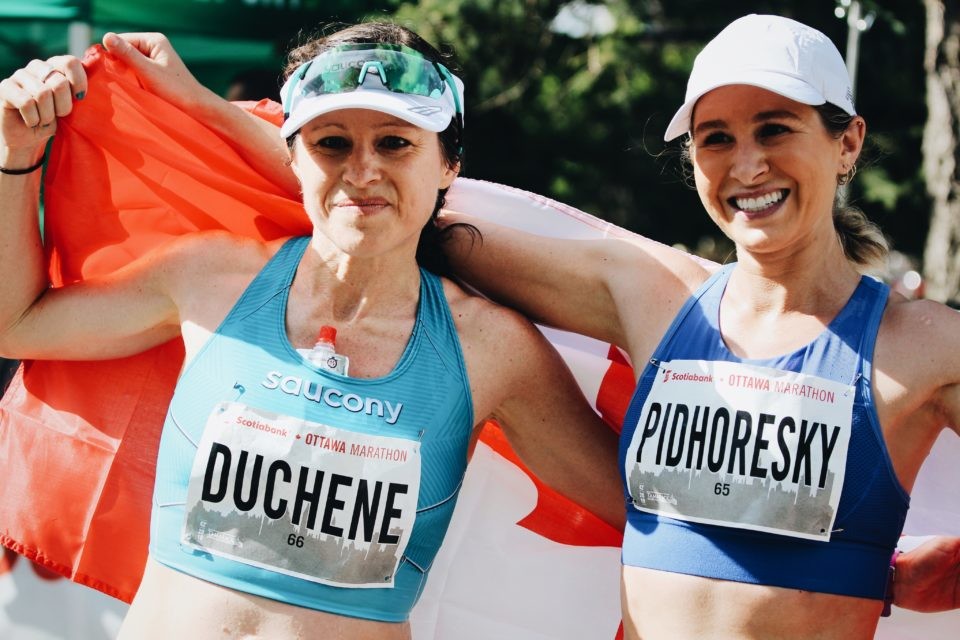
Canada is in the midst of a distance running renaissance that’s showing no signs of slowing down, and these women have played a major part in that. Wodak holds that fastest personal best of the Canadians. She ran a Canadian record in Houston a few weeks ago, becoming the first Canadian women to run under 1:10:00 for the half.
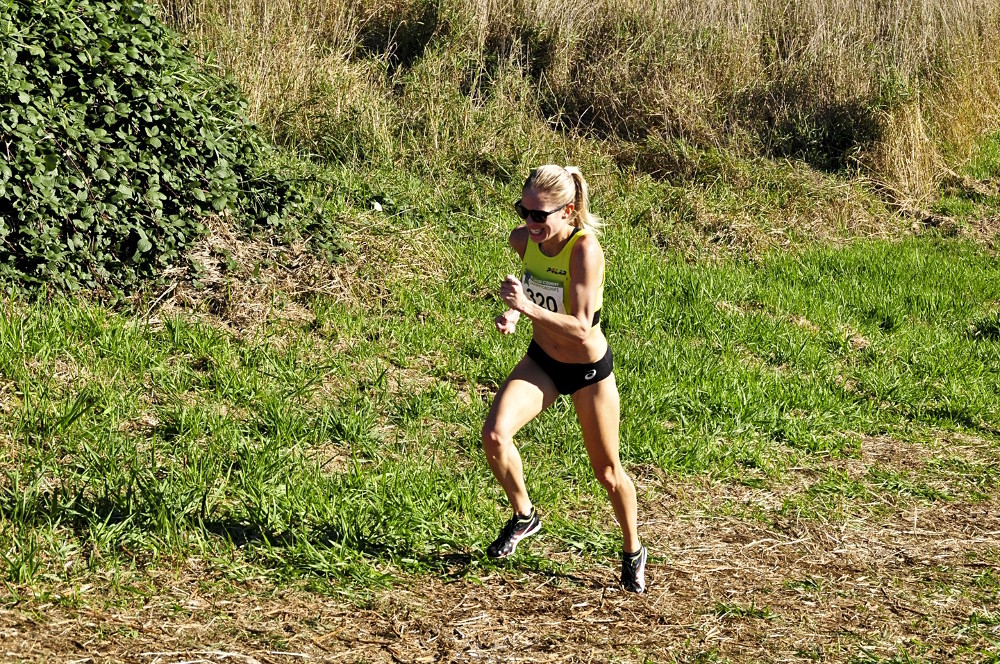
Her record of 1:09:41 stood for three weeks before it was broken by Andrea Seccafien, the current record holder, by two seconds.
DuChene is coming off her strongest year since 2015, running a 2:32:27 to win the master’s division at the 2019 Berlin Marathon. Middleton had a tough day at STWM in October but her 1:12:15 from Houston shows that she’s ready for a strong spring racing season. Myrand hasn’t put up a result since the World Championship marathon in Doha last September, so it’ll be interesting to see where she’s at. Her current personal best is a 1:15:50, a time she’ll likely lower.
Pidhoresky hasn’t touched her half-marathon personal best since the Niagara Falls half-marathon in 2011. Her 1:11:46 is sure to get broken, especially considering her Olympic qualifying marathon from STWM.
by Madeleine Kelly
Login to leave a comment
United Airlines NYC Half-Marathon
The United Airlines NYC Half takes runners from around the city and the globe on a 13.1-mile tour of NYC. Led by a talent-packed roster of American and international elites, runners will stop traffic in the Big Apple this March! Runners will begin their journey on Prospect Park’s Center Drive before taking the race onto Brooklyn’s streets. For the third...
more...The London marathon has announced a strong women´s field that includes six women who've run under 2:20
The 2020 London Marathon will see one of the most competitive women’s lineups in history. With five of the 10 fastest women of all time and six women with personal bests under 2:20, the race could see the fastest women’s finish ever.
The headliner is Brigid Kosgei, the world record-holder and reigning Chicago champion. The Kenyan ran the women’s marathon world record of 2:14:04 in Chicago last year. Other than her pacers, the runner was completely alone for almost the entire marathon. She shattered Paula Radcliffe’s 16-year-old world record of 2:15:25, which many considered to be nearly unbeatable and one of the toughest records in the books.
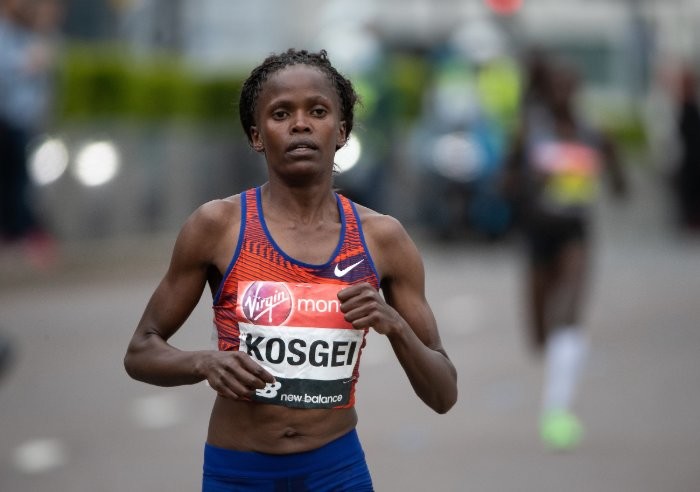
Joyciline Jepkosgei, the half-marathon world record-holder, is also in the field. Her 1:04:51 half-marathon record from 2017 was challenged by Kosgei in 2019, but wasn’t ratified due to the point-to-point Great North Run course.
Another runner to watch is masters marathoner Sinead Diver. The Irish-born runner now competes for Australia, where she lives and trains. She’s a member of the Melbourne Track Club and training partner to Canadian World Championship 5,000m finalist Andrea Seccafien.
The advantage to choosing London as a spring marathon for elite runners is the 13 week timeline to the Olympics. Because there are over three months between the two events (late April to early August), runners have time to build again and perform well at the Games.
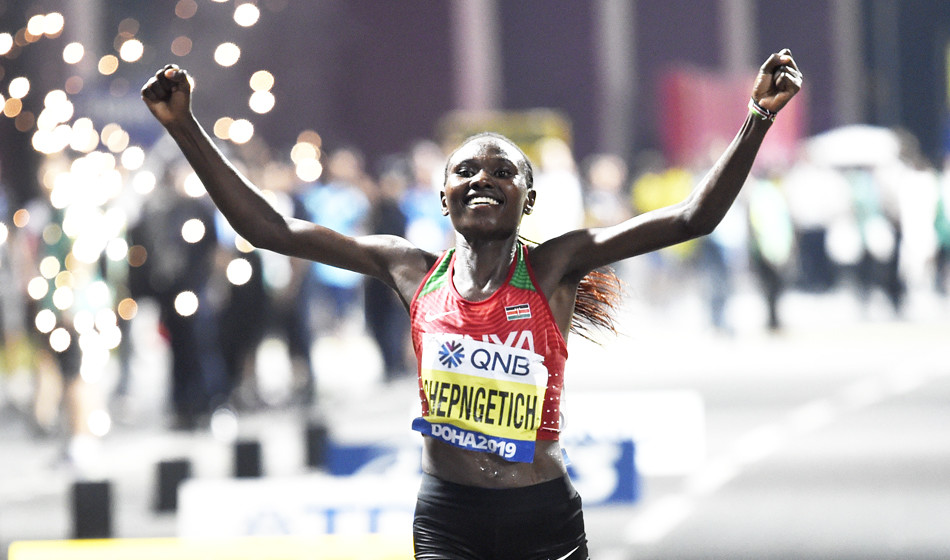
Those are the women who have run under 2:20: Brigid Kosgei – 2:14.04, Ruth Chepngetich – 2:17.08, Gladys Cherono – 2:18.11, Roza Dereje – 2:18.30, Vivian Cheruiyot – 2:18.31, Degitu Azimeraw – 2:19.26.
by Madeleine Kelly
Login to leave a comment
TCS London Marathon
The London Marathon was first run on March 29, 1981 and has been held in the spring of every year since 2010. It is sponsored by Virgin Money and was founded by the former Olympic champion and journalist Chris Brasher and Welsh athlete John Disley. It is organized by Hugh Brasher (son of Chris) as Race Director and Nick Bitel...
more...McSweyn breaks 10km record in Zatopek win
Running machine Stewart McSweyn is eyeing Tokyo Olympics glory after becoming the first man in more than two decades to win a hat-trick of Zatopek 10,000m titles.
The 24-year-old Tasmanian broke a national record that had stood for eight years in Melbourne on Saturday night, powering through the final lap on his own before saluting the crowd with three raised fingers as he crossed the line in 27 minutes and 23.80 seconds.
His time was more than one second faster than Ben St Lawrence's previous Australian-best mark of 27:24:95, set in 2011.
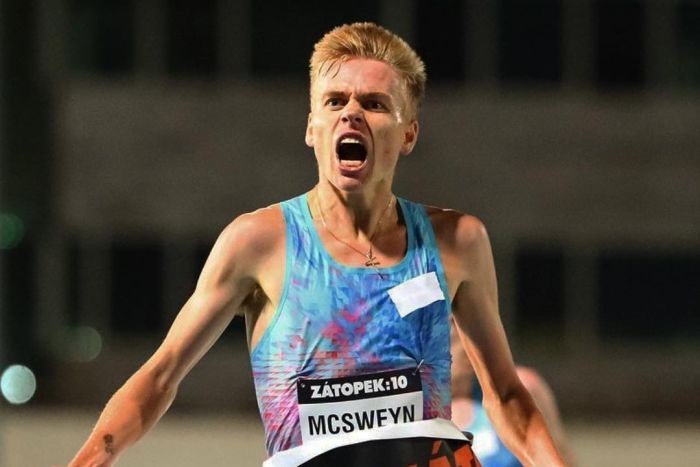
McSweyn also capped his massive year on a personal level by shaving more than 27 seconds off his own personal best time and cracking the Olympic qualifying standard in the process.
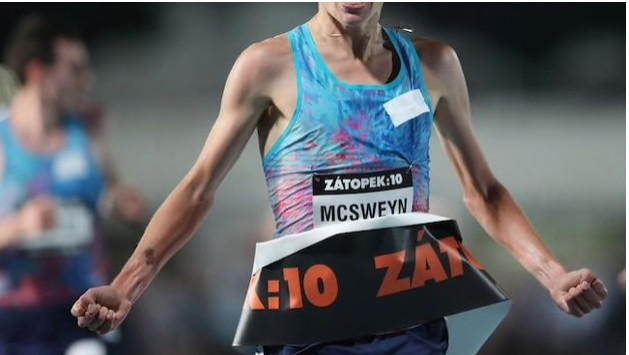
The versatile and rangy Kind Islander has also qualified for the 1500m and 5000m at Tokyo 2020 and now faces a big decision about which events he will contest.
"I'm kind of leaving it all open," McSweyn said.
"I'm just going to wait and see what I think is my best chance because I was in the (5000m) final in Doha (at the 2019 World Athletics Championships) and I want to go further than that next year.
"I want to try and be the guy who competes for medals."
Training partners Brett Robinson and Jordan Williamsz set the pace for McSweyn early and he had Queensland's Patrick Tiernan for company until the final lap, when he kicked into another gear and left his rival behind.
"To run that fast was probably a bit of a surprise but I think we owe a lot to Pat Tiernan for setting up that race," McSweyn said.
"What he was able to do after the pacemakers dropped out was pretty amazing.
"I know I was hurting the last 10 minutes and I was hanging on for dear life, so I think half the credit definitely goes to Pat for his run."
McSweyn is now within reach of matching Australian legend Steve Moneghetti's record of four consecutive Zatopek titles, claimed from 1989-92.
Earlier, dual Olympian Genevieve Gregson revealed she would target a spot in the 10,000m event at Tokyo after claiming her first Zatopek crown.
The 30-year-old Queenslander has already qualified for the 3000m steeplechase and will attempt to combine the two events.
Gregson won the Zatopek in 32:47:83, ahead of Canada's Andrea Seccafien (32:48.30), and would need to shave almost one minute and 23 seconds off her time to reach the Olympic standard.
"The goal was to win here, get my auto spot and now chase the time," Gregson said.
Login to leave a comment
Tokyo 2020 Olympic Games
Fifty-six years after having organized the Olympic Games, the Japanese capital will be hosting a Summer edition for the second time, originally scheduled from July 24 to August 9, 2020, the games were postponed due to coronavirus outbreak, the postponed Tokyo Olympics will be held from July 23 to August 8 in 2021, according to the International Olympic Committee decision. ...
more...Canadian record holder Rachel Cliff switches from marathon back to the track
Rachel Cliff has had an amazing 2019. The 31-year-old set a Canadian record in the marathon in March, running a 2:26:56 in her second-ever 42.2K.
She followed that race up with a very impressive track season, just missing out on the 10,000m world championship standard at Payton Jordan but hitting the 5,000m standard on Saturday at Heusden.
Cliff has always said that she wanted to have a proper track season this summer, and she’s making it happen. But it hasn’t been easy: “Changing from the track to the marathon, I did notice a difference in my strength and my speed,” she says. “The marathon gives you real confidence in your strength, but your speed can suffer. It’s been a lot tougher than it used to be to go fast. I can’t go out too hard any more, but I am very confident in my ability to hold a pace.”
The Canadian record-holder also says that while the marathon training has made speed a little more difficult, it has helped with her patience.
Cliff turned down the spot she was offered on the World Championship team earlier this year to compete over the marathon distance, hoping to be able to make the team on the track.
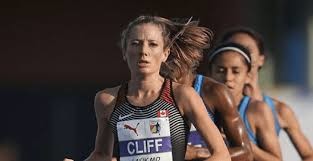
“The marathon is a big build and it would’ve meant that I couldn’t have the summer season on the track. It was kind of sad to say no to a world team, but it was the right decision for me.”
She continues, “I was really hoping to qualify in the 10K [for worlds], but those fast races are tough to come across.” Cliff was just shy of standard in the 10,000m but achieved standard just last week over 5,000m. She says if given the opportunity to run at worlds over the shorter distance, she would love to run. “In the short term I’m focusing on Pam Ams, but then we’ll see how nationals goes–if I end up making the worlds team or not.”
The Canadian women’s 5,000m is extremely competitive right now. Andrea Seccafien has been so consistent around 15:11 and looks like she’s ready for a big breakthrough, and Jess O’Connell is a very strong championship racer who always finds herself in the mix. Throw in Cliff, fresh off a great race in Europe, and you’ve got a very competitive field.
Cliff has traveled a ton this year. She ran her Canadian record in Japan and has also been to California and Europe for track races. She said flying is a real phobia of hers, but she’s getting better at unwinding. “My advice for pre-race travel is to try not to stress about the little things, for example, food.
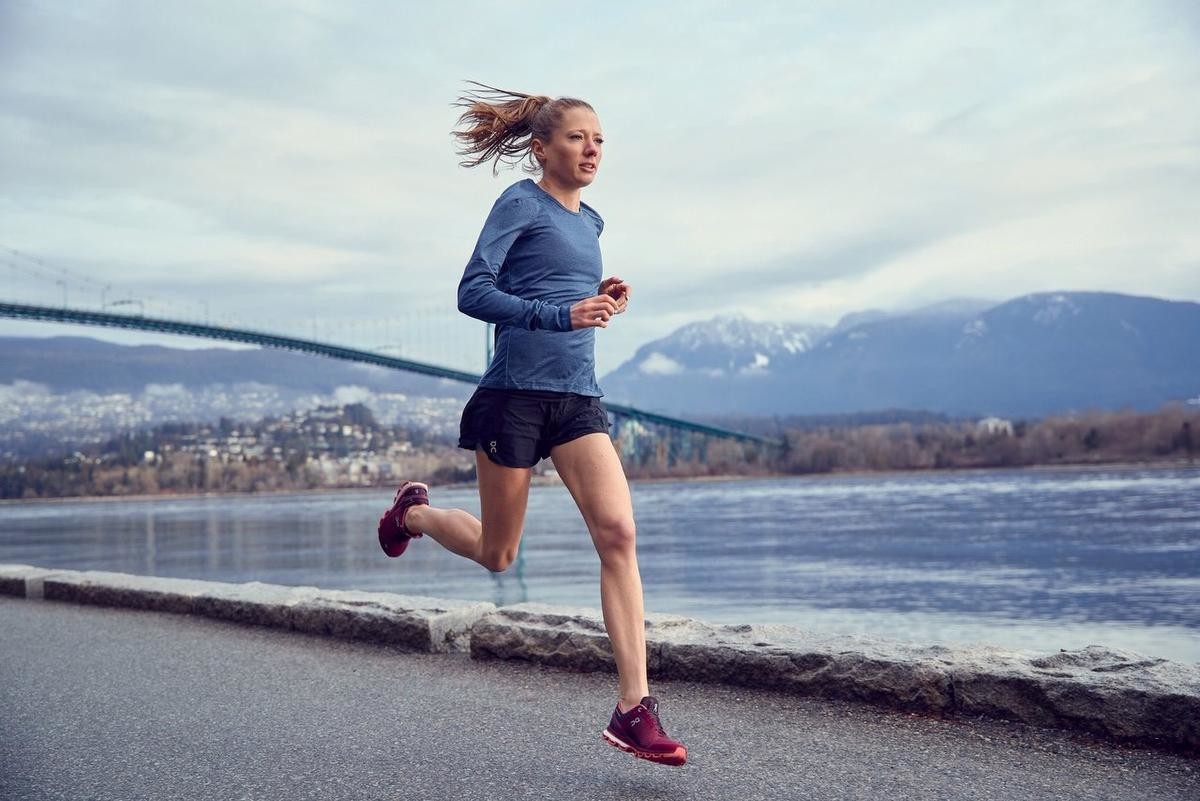
Food is something that can really stress out an athlete, but long as you don’t have anything too extreme, you can really eat anything. For me I find that tofu and rice are two things you can get about anywhere in the world, so I’ve gotten used to eating those two foods.”
She says she takes the same approach with sleep. “Sleep when you can, and try and sleep enough, even if it’s at strange times. The only thing that matters is that you’re not sleep deprived.”
For this weekend’s championship, Cliff is really excited to watch the women’s 1,500m and 800m. “It’s been awesome watching Melissa [Bishop-Nriagu] come back from having a baby and also exciting to see the new crop of 800m runners come up. Lindsey Butterworth is running so well–that’s a race I’m really excited to watch.”
As for her own championship goals, she’s happy with where she’s at and excited to compete against a strong group of Canadian women. “Running the [world] standard in a track event after the marathon is something I’m very happy about. I’m so glad I can come back to the track after the marathon and still find my speed.”
by Madeleine Kelly
Login to leave a comment
Nagoya Women's Marathon
The Nagoya Women's Marathon named Nagoya International Women's Marathon until the 2010 race, is an annual marathon race for female runners over the classic distance of 42 km and 195 metres, held in Nagoya, Japan in early March every year. It holds IAAF Gold Label road race status. It began in 1980 as an annual 20-kilometre road race held in...
more...Canada’s Andrea Seccafien is primarily a track runner but runs a solid Half Marathon
Login to leave a comment


